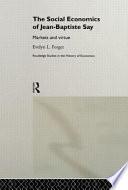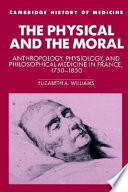 | Thomas Reid, Paul Wood - 1996 - 296 sider
...Consideration of the Mind', such as 'by what Motions of our Spirits, or Alterations of our Bodies, we come to have any Sensation by our Organs, or any Ideas...Formation, any, or all of them, depend on Matter, or no'. 87 Yet despite Locke's formal disavowal of physiological theorizing, there are a number of passages... | |
 | Birgit Christensen - 1996 - 316 sider
...9. wherein its Essence consists, or by what Motions of our Spirits, or Alterations of our Bodies, we come to have any sensation by our Organs, or any Ideas...Formation, any, or all of them depend on Matter or no.»'37 Auch Condillac schliesst diese Fragestellung aus: «II seroit inutile de demander quelle est... | |
 | Evelyn L. Forget - 1999 - 324 sider
...examine wherein its essence consists or by what motion of our spirits, or alterations of our bodies, we come to have any sensation by our organs, or any ideas in our understanding; and whether those ideas do, in their formation, any or all of them, depend on matter... | |
 | Juliet Floyd, Sanford Shieh - 2001 - 482 sider
...examine, wherein its Essence consists, or by what Motion of our Spirits, or Alterations of our Bodies, we come to have any Sensation by our Organs, or any Ideas in our Understandings." Setting aside any concern with the physiology or ontology of nervous system and mind, Locke firmly... | |
 | Elizabeth A. Williams - 2002 - 306 sider
...examine wherein its essence consists; or by what motions of our spirits or alterations of our bodies we come to have any sensation by our organs, or any ideas...formation, any or all of them, depend on matter or not.'4'' Condillac had reflected on the operations of mind with the help of a hypothetical statue rather... | |
 | David C. Lindberg, Roy Porter, Ronald L. Numbers - 2003 - 956 sider
...[the mind's] Essence consists, or by what Motions of our Spirits, or Alterations of our Bodies, we come to have any Sensation by our Organs, or any Ideas...Formation, any or all of them, depend on Matter or no," remarking that "[t]hese are Speculations, which, however curious and entertaining, I shall decline,... | |
 | Carl Zimmer - 2004 - 382 sider
...examine wherein its essence consists, or by what motions of our spirits, or alterations of our bodies, we come to have any sensation by our organs, or any ideas...formation, any or all of them, depend on matter or no." Locke claimed that the workings of the mind were incomprehensible. He would talk only about ideas themselves... | |
 | Ellwood Johnson - 2005 - 300 sider
...opinion, and assent; — I shall not at present meddle with the physical consideration of the mind; . . . and whether those ideas do in their formation, any or all of them, depend on matter or not. And he was especially reacting against the "atheism" of Thomas Hobbes, whose Leviathan portrayed... | |
 | Michael Losonsky - 2006 - 304 sider
...problem: "I shall not... trouble my self to examine, wherein [the mind's] Essence consists" and whether "Ideas do in their Formation, any, or all of them, depend on Matter, or no." Instead, Locke announces that he will "consider the discerning Faculties of a Man, as they are employ'd... | |
 | Howard Schweber - 2007 - 15 sider
...examine, wherein its essence consists, or by what motions of our spirits, or alterations of our bodies, we come to have any sensation by our organs, or any ideas...formation, any, or all of them, depend on matter, or no. These are speculations, which, however curious and entertaining, I shall decline." (Locke [1689], 1982:... | |
| |